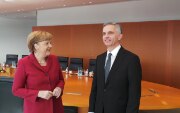Mr Burkhalter's address to the Security Council will allow him to explain the priorities of the Swiss OSCE Chairmanship and speak about cooperation between the regional security organisations and the United Nations. He will also reiterate the OSCE's willingness to play an active role with regard to the crisis in Ukraine and provide expertise to support possible solutions.
From New York, the President of the Swiss Confederation will travel to Washington where he will meet with the members of the United States Commission on Security and Cooperation in Europe, more commonly known as the US Helsinki Commission, which has considerable influence within the OSCE. Mr Burkhalter will also speak on the priorities of the Swiss OSCE Chairmanship and the crisis in Ukraine before the members of the commission, which is made up of 18 members of Congress and a representative from the State Department, the Department of Commerce and the Department of Defense.
Before returning to Switzerland to take part in the Federal Council meeting, the head of the FDFA will be received by the vice president of the United States, Joe Biden. The discussion between the two men will mainly focus on bilateral relations and the possibilities presented by the OSCE for overcoming the crisis in Ukraine. Mr Burkhalter will in particular set forth the results of his contact with the Ukrainian authorities and the proposals he made to them on behalf of the OSCE.
Mr Burkhalter and Mr Biden will also take stock of relations between their two countries. Close ties result from the fact that more than a million US citizens have Swiss backgrounds. Economic relations are also good, with the United States the second biggest market for Swiss exports after the European Union (Swiss exports to the United States in 2012: CHF 25 billion, imports: CHF 11 billion).
Further information:
Relations between Switzerland and the United States
FDFA web dossier on the OSCE
Swiss Chairmanship of the OSCE on Twitter
Twitter Switzerland at the UN
Address for enquiries:
Information FDFA
Bundeshaus West
CH-3003 Bern
Tel.: +41 58 462 31 53
Fax: +41 58 464 90 47
E-Mail: info@eda.admin.ch




